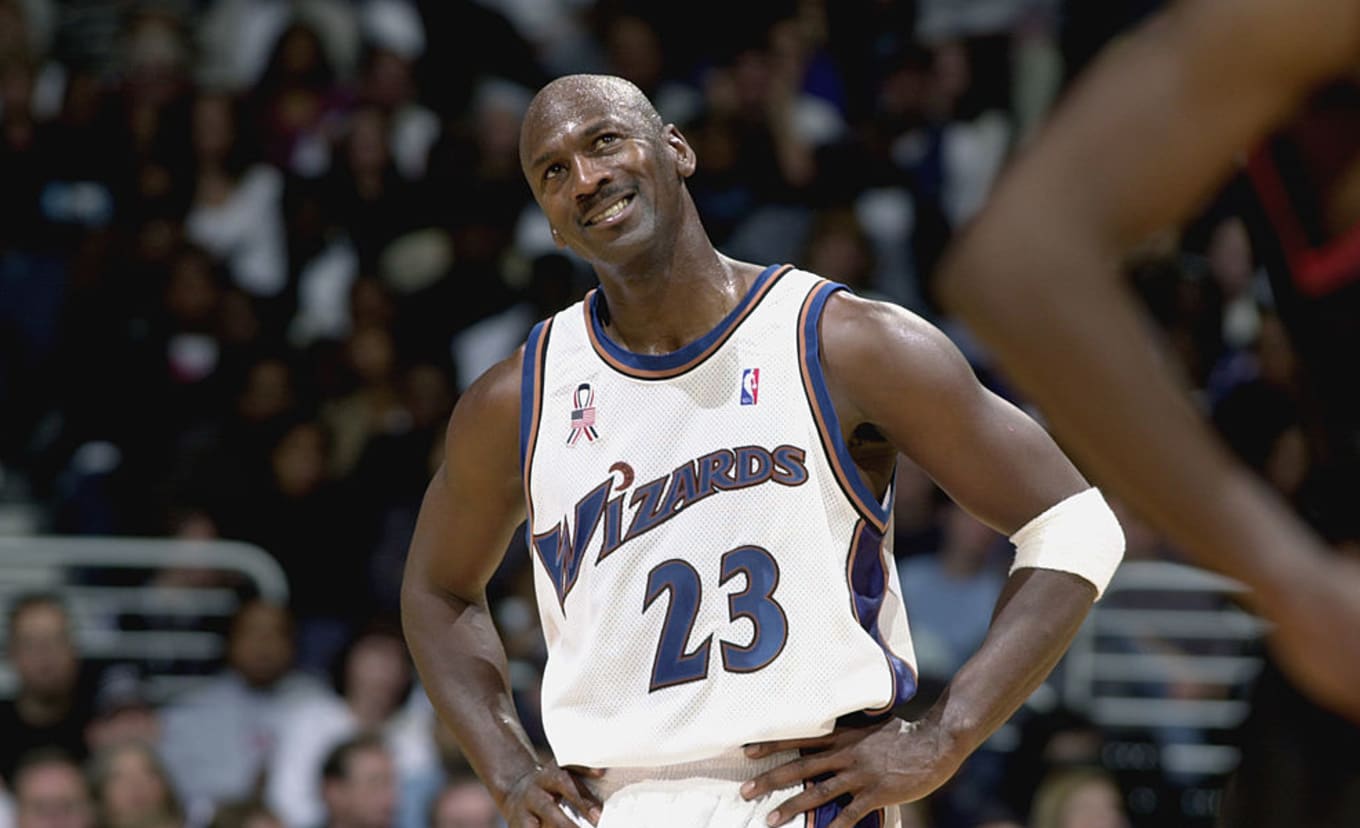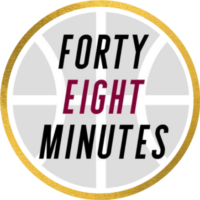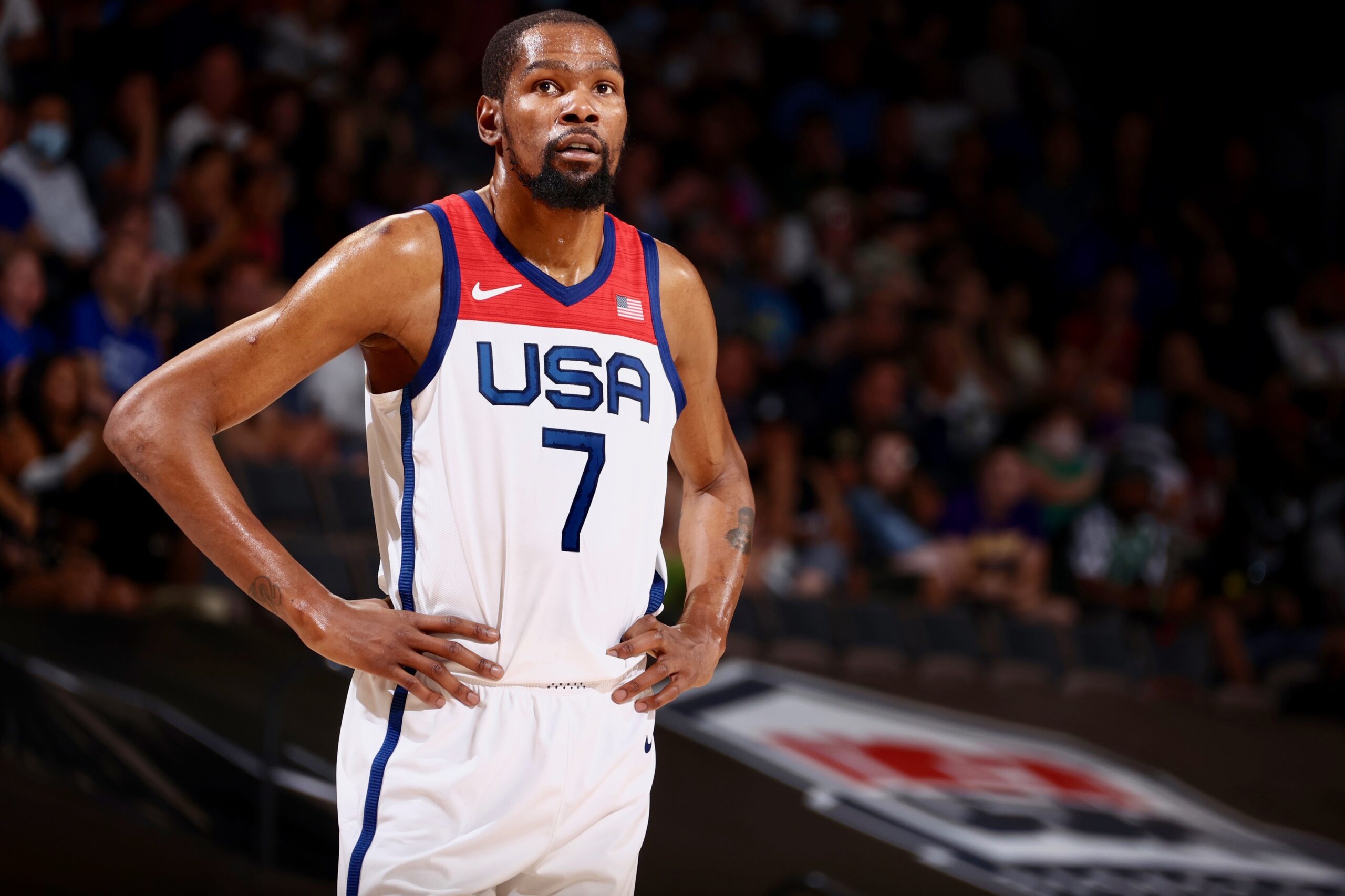Michael Jordan retired from the NBA for the third and final time at the age of 40 but not before writing a chapter of his storied career in Washington.
Let’s take a look back at 48 facts from Jordan’s time with the Wizards:
- In January of 1999, Jordan was announced as a minority owner of the Wizards, owning a 10% stake in the franchise. The former Bulls great would become the team’s director of basketball operations.
- The Wizards finished the year with a record of 29-53.
- The 2000-01 season was Jordan’s first full campaign as an executive and it was not much of a success from an on-court standpoint. The club went 19-63, though Jordan’s presence did increase the attendance in Washington.
- The following September, Jordan announces that he’ll be joining the Wizards as a player.
- Jordan donated his salary ($1 million) that year to help those impacted by the 9/11 terrorist attacks.
- To play again, Jordan had to divest his shares in the team. He sold his 10% stake and resigned as the team’s director of basketball operations to take the court alongside many of the players he had hand-picked to be there.
- Jordan also owned a 10% stake in the NHL’s Washington Capitals, obtaining it when he became part-owner of the Wizards; he sold those shares when he sold his Wizards ownership.
- There was a perception at the time that Jordan joining the Wizards at the end of his career would tarnish his legacy, though he was still an impressive player on the court.
- Charles Barkley had considered making a comeback alongside Jordan, ultimately opting to stay retired.
- Leading up to his return, Jordan had played pick-up basketball with several top NBA players. One of the players participating was Metta World Peace, who is rumored to have broken two of Jordan’s ribs during the summertime contests. “It was a mistake,” World Peace told Brandon ‘Scoop B’ Robinson. “Actually, I’m not going to tell you it was a mistake, it was really aggressive basketball.”
- Jordan surpassed the 30,000-point mark on his career during his first season in Washington.
- He became the oldest player (38) to score over 50 points in a game, as he notched 51 in December of 2001 against the Charlotte Hornets.
- His Airness averaged 22.9 points, 5.7 rebounds, and 5.2 assists as a 38-year-old during his first season in Washington.
- Jordan would make the 2002 All-Star Team as a starter, giving the franchise its first All-Star since Chris Webber during the 1996-97 season.
- Jordan injured his knee in the final game before the All-Star break and prior to that, he was one of just two players averaging at least 25 points, five rebounds, and five assists (Kobe Bryant).
- Jordan missed 22 games in the season, mostly because his knee troubles.
- Washington went 30-30 in the games that Jordan played.
- Washington went 7-25 in the games that Jordan missed.
- Only Allen Iverson (37.8) had a higher usage rate than Jordan during his initial year in Washington.
- Jordan finished the 2001-02 campaign with a player efficiency rating of 20.7.
- Only 16 players had a better PER that year. Jordan’s 20.7 rating bested Vince Carter, David Robinson, and Jason Kidd among others.
- MJ was listed on several media members’ MVP ballots, finishing 13th in voting.
- Jordan’s Wizards finished second in the league in attendance (behind the Spurs) during that 2001-02 season, per BBR.
- In his final campaign, the Wizards finished second in the league again, this time falling right behind the Pistons.
- Jordan continued to remain involved with roster decisions and had a say in the six-player trade that brought Jerry Stackhouse to Washington.
- The club sent out rising prospect Richard Hamilton as part of the package for Stackhouse.
- Stackhouse wasn’t thrilled about the trade at first. “I’m just disappointed … because I have to leave my home,” Stackhouse said (via ESPN in 2002). “I have to leave a fan base that has grown with me since I’ve been here and who have been just unbelievably great for me. It’s not easy, but at the same time it comes with this business and I understand that.”
- Jordan started the 2002-03 season as the team’s Sixth Man, playing behind Stackhouse.
- That only lasted 15 games, as Jordan would return to the starting lineup about a month into the season.
- It was widely known that the 2002-03 season would be Jordan’s final campaign in the NBA, as the 6-time champion would thereafter retire for the third and final time.
- Jordan would win the Player of the Week award twice during the season (Jan 5, 2003; March 2, 2003).
- Despite dealing with knee woes, Jordan made the All-Star team again.
- The 2003 All-Star Game was Jordan’s 14th appearance, which was a record at a time (Kobe Bryant would later claim the record).
- Jordan played 36 minutes during his final All-Star appearance (Iverson was the only player on the East to see more court time).
- Jordan dropped 43 points against the Nets late in the season, becoming the only player 40 or older to score 40 or more points in a game.
- His final game (April 16, 2003) was a 20-point loss to the Allen Iverson-led Sixers. Jordan scored 15 points.
- In each of Jordan’s first 14 NBA seasons, he led his team in points per game.
- The 2002-03 season was the only campaign where Jordan didn’t lead his team in points per game (Stackhouse had 21.5 while Jordan averaged 20.0).
- Jordan still finished 18th in the league in points scored that season.
- Jordan was the only member of the Wizards to play in all 82 games during the 2002-03 season.
- Washington finished that season with a record of 37-45 on the year.
- Every team in the league compiled at least one win against the Wizards that season with the exception of the Cavaliers and the Clippers (went 0-6 combined vs. Washington).
- Jordan’s 6.1 rebounds per game ranked second on the team behind only Christian Laettner (6.6). Kwane Brown (5.3) was third.
- At-the-time Wizards owner Abe Pollin fired Jordan in May of 2003, which ended his time with the franchise. Jordan’s assembling of the team was cited as a reason why he was dismissed.
- After Jordan’s departure, front office duties were handed to Ernie Grunfeld, who became the new GM.
- Jordan, of course, later found ownership of an NBA team again. In 2010, he bought into the Charlotte Bobcats, which have since been re-named the Hornets.
- Jordan’s 19.9 player efficiency rating as a member of the Wizards ranks seventh in franchise history, just ahead of John Wall‘s 19.4. The six currently ahead of Jordan: Walt Bellamy (23.9), Moses Malone (22.4), Chris Webber (21.2), Gilbert Arenas (21.0), Thomas Bryant (20.8), Terry Dischinger (20.1).
- Jordan paces the franchise in all-time usage percentage at 31.7.












